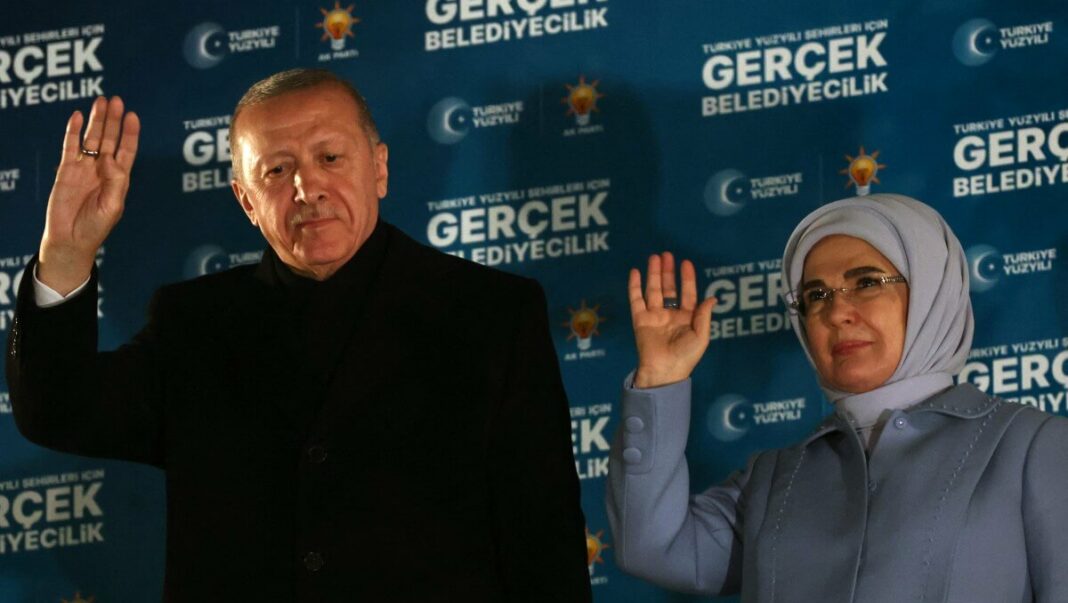As the euphoria of a municipal election drubbing of President Recep Tayyip Erdoğan ebbs, Turks are left watching their wallets, with inflation that has sapped the longtime leader’s appeal, driving up costs for everyday basics.
Even as the government vows austerity measures and the central bank hikes rates, price growth “is not stopping, it’s going up,” said economist Murat Sağman, founder of Sagam Strategy Advisory.
Official data released Wednesday put year-on-year inflation at 68.5 percent in March, up from 67.07 percent the previous month.
ENAG, a group of independent economists, said their own calculations put the annual figure at almost 125 percent and rising.
“In the market, [it’s] one price in the morning, another price in the evening. I can’t make a living if I sell this corn at a cheaper price,” said Osman Karakoç, 64, selling grilled corncobs for 30 lira ($0.93) apiece from a small cart outside a mosque at Istanbul’s Spice Bazaar.
“It’s the product of our country, but we can barely buy it,” he added.
Erdoğan, in power since 2003, was once feted for Turkey’s economic success story, but in recent years it has become his Achilles heel.
Anti-inflation squeeze
Some of the surge in price growth over recent years was due to Erdoğan’s unorthodox views on monetary policy.
The Islamic conservative president long blamed inflation on high interest rates, whereas mainstream economists see increasing the cost of borrowing as a way to brake activity and thereby ease pressure on prices.
More recently, Erdoğan has allowed Turkey’s central bank to hike its main policy rate from just 8.5 percent before his re-election last May to 50 percent last month.
But the monetary authority lists other factors still feeding inflation, including a weak lira currency — down 40 percent against the dollar in a year — a massive jump in the minimum wage in January and surging costs for food and fuel.
The government must follow through on its promises to slash spending to complement the central bank’s efforts to slow price growth, Sağman said.
“It’s the only way to lower inflation, to make the whole policy tight for a certain period of time,” he said.
Nicholas Farr of Capital Economics commented that “further monetary tightening lies in store… a more concerted effort to tighten fiscal policy will be needed too.”
“We will do whatever is necessary until we reach our goal of price stability, which is our top priority,” Finance Minister Mehmet Şimşek said Wednesday.
Shoppers at İstanbul’s Spice Bazaar were emphatic about feeling the pinch.
Many browsing the stalls piled high with olives, fish, cheese and spices were pensioners living on incomes of around 10,000 lira per month.
“I have been voting for Erdoğan for as long as I can remember… We trusted Tayyip and turned a blind eye to everything, but enough is enough,” said Leyla Duman, a housewife in her 60s wearing an Islamic headscarf with sunglasses and a long coat.
“They give 10,000 lira to pensioners: Should people pay their rent or pay their bills with it?” she asked.
Her husband Serif, a 63-year-old working at the highway’s authority, said that he “cannot retire out of fear” as the basic pension “is not enough.”
The couple showed off two small plastic bags of shopping they said had cost them 3,000 lira, with items including 100 grams (3.5 ounces) of coffee and toys for their granddaughter.
“Our money is melting every day,” Serif said.
Soft landing?
One factor in Erdoğan’s favor is the lack of elections until Turks next vote for their president in 2028, offering a window for potentially painful steps to restrain price growth.
“We have a lot of time to make all the structural reforms” but “I think we’re going to see a slowdown in the economy” with high rates and tight spending, economist Sağman said.
The challenge for the central bank and finance ministry is “to go to a soft landing [rather] than go to a hard landing,” he added.
Such terms draw a distinction between clamping down on price growth without completely slamming the brakes on activity, versus inflation-fighting measures triggering a severe recession.
In the meantime, “the cheese we bought for 60 lira… went up to 250, 280, 300 lira,” said Hasan Yildiz, a 70-year-old retired coal miner.
“Instead of buying half a kilo, we buy 250 grams now… It’s getting very difficult for us.”
© Agence France-Presse

